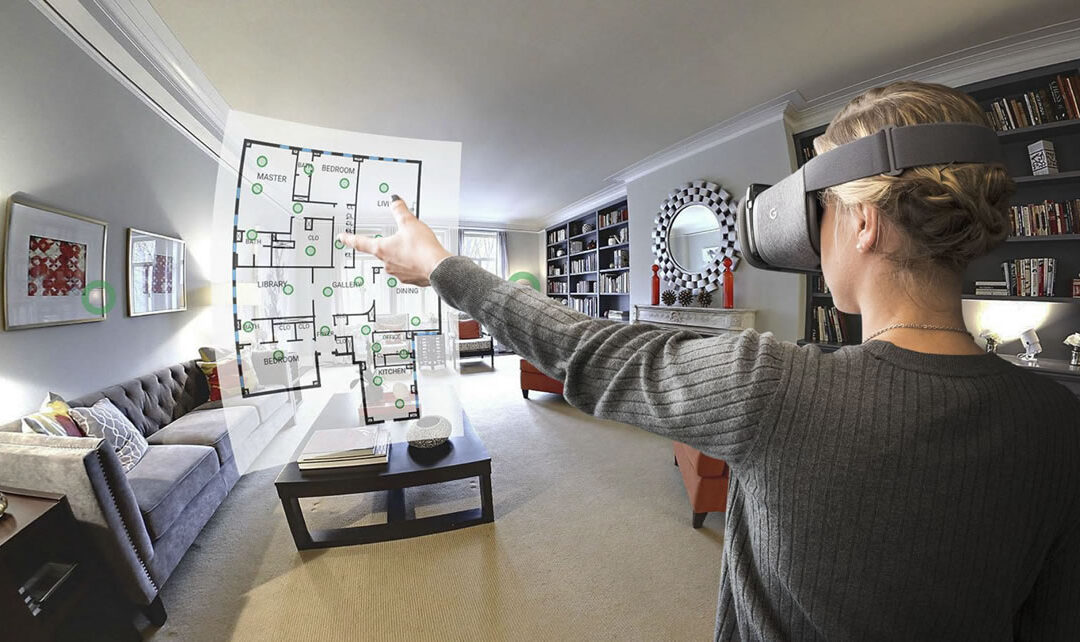The real estate industry has undergone significant changes in the past few years due to the advent of technology. As we traverse 2023, several trends will shape the industry’s future. This article will explore the top five technology trends that could dominate the real estate sector in the coming year.
- Virtual Reality (VR) and Augmented Reality (AR)
The COVID-19 pandemic has accelerated the adoption of VR and AR in the real estate industry. With social distancing measures in place, many agents and property owners have turned to virtual property tours as an alternative to live showings. VR and AR technology offer prospective buyers a realistic and immersive experience, allowing them to view properties from the comfort of their homes.
In addition to sales, VR and AR technology are expected to transform the rental business. Landlords and short-term rental hosts are providing virtual tours with their listings to attract renters. A recent Matterport survey found that 55% of renters would be more likely to rent a property if they could view it through a 3D tour. This indicates that VR and AR technology used in the rental market is expected to become the norm.
- AI-Enhanced Analytics
Artificial intelligence (AI) has been transforming the real estate industry for several years, and significant advancements have occurred recently. AI and big data have enabled property investors to find and analyze deals at a rate and speed that was previously unimaginable.
In 2023, quantum computing AI is expected to be a game-changer in the real estate industry. This emerging technology has the potential to process vast amounts of data in a fraction of the time it takes traditional computing systems. As the technology develops, we can expect more PropTech startups and companies to apply quantum computing AI to their algorithms, making it easier and faster for investors to find and analyze deals.
- Streamlining All Processes
Enhanced efficiency is one of the most significant benefits of the technology boom in real estate. Real estate agents, brokers, lenders, property managers, investors, and even homebuyers and sellers can automate many tedious day-to-day responsibilities, allowing them to complete tasks faster and more efficiently than ever.
In 2023, we can expect to see a further surge in comprehensive platforms that take a specific niche or cover everything from A to Z. Streamlining processes is essential, and there is considerable demand among various real estate professionals for platforms that offer end-to-end solutions. This trend will enhance efficiency and improve the customer experience for all stakeholders.
- Fractional Ownership
Fractional investment is another real estate technology trend that is expected to continue its growth in 2023. Thanks to technology, this trend is seen as the democratization of the real estate market. Previously, investors needed to have substantial amounts of initial capital to invest in real estate. However, several PropTech platforms now allow investors to invest in parts of real estate properties with smaller investments.
Fractional ownership has the potential to bring more people into the real estate market, making it easier for individuals to invest in properties they would not have been able to afford otherwise. This trend is expected to grow as more people realize the potential of fractional ownership in real estate.
- The Metaverse
The metaverse is a virtual world that has recently gained significant popularity. It is a digital realm where individuals can interact with one another in a virtual environment. The global metaverse real estate market was valued at $821.9 million in 2021, with a projected increase to $5.95 billion by 2028.
With the introduction of blockchain technology, VR, AR, and other real estate technology trends, the metaverse is expected to drive the growth of virtual real estate and investment opportunities in 2023. While buying assets in a virtual world is a relatively new concept, it offers a unique way to diversify portfolios. However, investors are likely to proceed cautiously, and shifting all investments from physical real estate to virtual properties is not advised.
In conclusion, the real estate industry is expected to witness significant changes in 2023, and technology will play a crucial role in shaping its future. The adoption of VR and AR technology, AI-enhanced analytics, streamlining of all processes, fractional ownership, and the metaverse are among the top trends that will dominate the industry. To stay competitive, real estate professionals must be open to new technology and understand how it can improve efficiency and the bottom line. By embracing these trends, real estate professionals can provide a better customer experience and remain competitive in a rapidly evolving industry.

